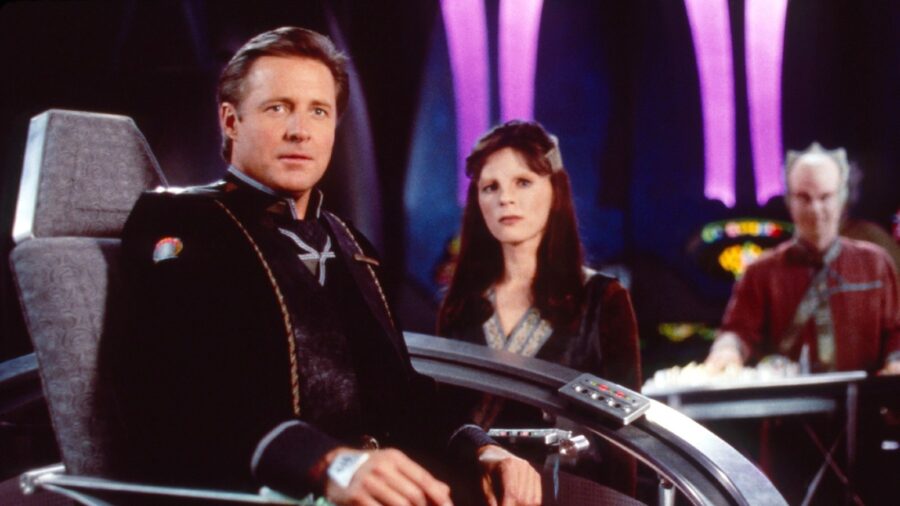The Tragic Reason Babylon 5 Made A Dramatic Change In Season 2

Unlike nearly every other sci-fi show, Babylon 5 was carefully planned out from day one to be the singular vision of creator J. Michael Straczynski, but he always had a plan for if something happened. Sadly, one was used in Season 2 for the series lead, Michael O’Hare, who was replaced by Tron star Bruce Boxleitner, and no one knew why until decades later. As it turns out, O’Hare suffered from schizophrenia, and as his disease got worse, working on the series was no longer an option.
As impressive as it is that Babylon 5 was able to move forward with such a major change, the behind-the-scenes reality is a sobering reminder that we never know what battles anyone is fighting in private.
Michael O’Hare Left Babylon 5

Michael O’Hare played the Commander of Babylon 5, Jeffrey Sinclair, who is promoted to that position by the Minbari, as he possesses the reincarnated soul of their legendary hero. After Season 1, Sinclair is removed as Commander and becomes an Ambassador to the Minbari. Sinclair eventually discovers the prophecy about him isn’t entirely accurate, and the reality is even more impressive.
Needless to say, he was going to play a major part in the series, and though O’Hare couldn’t continue, he still credited the series with helping him in his struggle. Throughout Seasons 2 and 3, he’d appear sporadically on Babylon 5 as a guest star to close out Sinclair’s arc.
A Major Change

When Bruce Boxleitner’s character, John Sheridan, took over in Season 2, fans at the time thought it was a little odd, but Boxleitner’s performance quickly won them over. Thanks to Straczynski’s careful planning, the “trap door” triggered to remove Michael O’Hare from the show gracefully, made it one of the most graceful exits of the 90s.
Compare Babylon 5 changing leads to how the Power Rangers removed half the original cast, or even multiple sitcoms swapping out actresses (notably Fresh Prince of Bel-Air), but to show the respect the cast and crew had for O’Hare, no one leaked why this happened.
Season 1 Is Even More Impressive

It wasn’t until 2012 that J. Michael Straczynski, at a comic convention months after Michael O’Hare passed away, shared his friend’s mental health diagnosis with the world, and the fanbase reacted with an overwhelming outpouring of love.
Fans went back and watched Season 1 classics, including “By Any Means Necessary,” which sees Sinclair solving a strike on Babylon 5 using only his intelligence and understanding. Now, go back and watch that episode, knowing that O’Hare was suffering from paranoid delusions and hallucinations at that time, and yet he was able to give a nuanced and layered performance.
O’Hare Finished What He Started

Sadly, Michael O’Hare stepped away from acting when he left Babylon 5, making only a few guest appearances and some small voice acting roles until he officially retired in 2000 to focus on his mental health. It’s unfortunate the series had to change leads, but at least O’Hare gave some legendary performances while he could, as even today, numerous sci-fi fans will insist that the pilot, Midnight at the Firing Line,” is one of the greatest first episodes ever filmed.
Michael O’Hare Put Others First

Michael O’Hare’s schizophrenia is unfortunate, but when he was asked if production on Babylon 5 should be suspended to accommodate him, he said no, as he didn’t want the show to get canceled over him. As we all learned later, he made Straczynski promise to keep the reason a secret until his passing, at which time everyone could know, with the hope of raising awareness and support for others who were suffering in silence and without the support of a Hollywood production.
Jeffrey Sinclair may have been a prophesized hero of the Minbari, but that’s because of Michael O’Hare’s bravery in the face of a debilitating and horrifying diagnosis. Babylon 5 would not have been a hit without O’Hare’s performance, and thanks to him allowing his diagnosis to go public, he helped remove some of the stigma from schizophrenia and helped improve the lives of others. That’s what heroes do.













